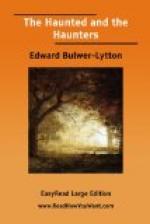He writes that, queerly enough, he lost all sense of size. He was not a Gulliver looking down upon Lilliput; the mounds ten inches high became to him actual and lofty summits. The tiny precipices were tremendous. And the red ants swarmed to attack the black ants that held the heights with savage and desperate fury. He says he panted with excitement as he watched the courage of the attack and defence, the savagery of the “hand-to-hand” fighting. The black and red fell by myriads, and the doctor had persuaded himself that he observed amazing incidents of individual heroism. One particular range seemed to be the especial aim of the red forces, and they swarmed up victorious and held it for a while, and then retreated. The doctor could not quite make out the reason of this. He started violently when his man called to him. Roberts said he had called for five minutes without getting an answer, and that the Dean was in a hurry, with only five minutes to spare. So the Prebendary went into the house in a kind of dwam, as the Scots put it, and had no notion of what the Dean had to say; and when he got back to the garden he found his gardener smoothing the plot with a long rake, and raking in a lot of dead ants with the mould. The gardener said it was the boys; but the doctor took no notice, and went to the Custos that night, and the Custos reading his paper a fortnight later began to think that the old Prebendary was a prophet.
And the Prebendary? He ends his letter: “Quod superius est sicut quod inferius” ("that which is above is as that which is below"), as the Smaragdine Tablet of Hermes Trismegistus testifies, and it is my belief that this is a world battle in the sense which we do not appreciate. There have been some who have held that the earthly conflict is but a reflection of the war in heaven. What if it be reflected infinitely, if it penetrate to the uttermost depths of creation? And if a speck of dust be a cosmos—the universe—of revolving worlds? There may be battles between creatures that no microscope shall ever discover.
FOOTNOTES:
[Footnote 3: The Little Nations.]
X
THE SEVEN LIGHTS
From WILSON’S “Tales of the Borders”
John M’Pherson was a farmer and grazier in Kintyre—a genuine Highlander. In person, though of rather low stature than otherwise, he was stout, athletic, and active; bold and fearless in disposition, warm in temper, friendly, and hospitable—this last to such a degree that his house was never without as many strangers and visitors of different descriptions, as nearly doubled his own household.
To the vagrant beggar his house and meal-chest were ever open; and to no one, whatever his condition, were a night’s quarters ever refused. M’Pherson’s house, in short, formed a kind of focus, with a power to draw towards itself all the misery and poverty in the country within a circle whose diameter might be reckoned at somewhere about twenty miles. The wandering mendicant made it one of his regular stages, and the traveller of better degree toiled on his way with increased activity, that he might make it his quarters for the night.




